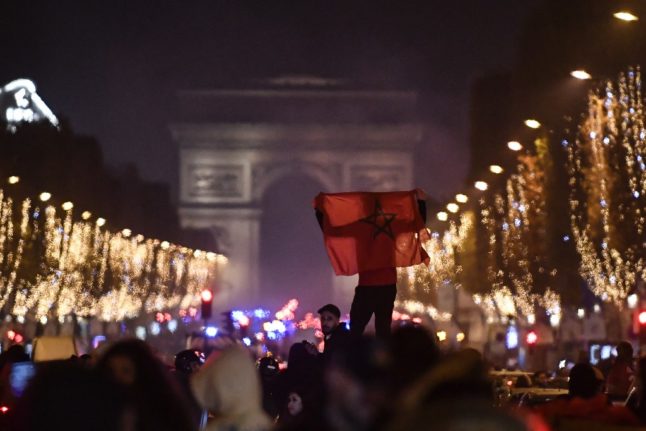Les bleus take on Morocco on Wednesday at 8pm (French time) in the semi-final of the 2022 World Cup – and if you’re in France you can expect a lively evening.
Big screens and 10,000 police: What you need to know about the France v Morocco game
More than 17 million people tuned in to watch France and England play on Saturday, and the France vs Morocco game is set to draw an even wider audience.
Here’s why the game is about more than just football.
A brief history
The two countries have a history, and not of the romantic kind – yes, this is about colonialism.
France colonised and invaded Morocco’s neighbour Algeria in 1830 and, when it became clear some years later that the Moroccan sultan was sympathetic to the Algerian liberation movement, the French moved in on Morocco too. In 1904, France and Spain developed ‘spheres of influence’ in Morocco and in 1912 the two countries divided Morocco into two protectorates.
France created designations for the different parts of Morocco – urban areas were typically considered “Maroc Utile” and rural areas, “largely inhabited by Amazigh/Berber people,” were categorised as the not-at-all insulting “Maroc Inutile” (useless Morocco).
After uprisings against the French colonial authorities, Morocco eventually negotiated its independence in 1956.
Since then, relations between the two countries have been generally cordial with periodic moments of tension.
Foreign minister Catherine Colonna is due to make a trip to Morocco later this month in an attempt to smooth over some recent issues, including France’s decision in 2021 to cut the number of visas issued to Moroccans by 50 percent, arguing that the move was due to Morocco’s “unwillingness” to cooperate in the extradition of irregular Moroccan migrants in France.
The Moroccan diaspora
Partly due to the aforementioned colonialism, Morocco has a huge diaspora – there are estimated to be approximately five million Moroccans and their immediate descendants living abroad, compared to a current population of Morocco of 37 million.
The country that attracts Moroccans the most is France – with over a third of the Moroccan diaspora making l’Hexagone their home.
According to INSEE, as of 2019, Moroccans were the second-largest non-EU immigrant group in France, making up about 18.4 percent of the total immigrant population.
Moroccans – and other members of the North African diaspora – living in France have also had a big impact on the country’s culture, from food to language. In 2021, France voted couscous, a staple of Maghrebi cuisine, as its favourite dish. Many famous French people also have Moroccan origins, like Leïla Slimani, the Franco-Moroccan writer and journalist.
Loyalties among many Moroccans in France may be divided on Wednesday with many of them also supporting the French team in football tournaments.
However it’s likely it won’t just be the Moroccan diaspora backing the Atlas Lions – as the football team are known – with those from North African countries like Algeria and Tunisia also likely to show support.
Teammate against teammate
While not quite brother against brother, the 2022 Morocco World Cup team has a lot of French influence – including two players born in France (Roman Saiss and Sofiane Boufal).
Many people are also likely familiar with Achraf Hakimi, who plays for Paris Saint-Germain and is a good friend of France’s star player Kylian Mbappé.
The two have even been trading tweets ahead of the big game:
See you soon my Friend ❤️🤝🏽 @KMbappe
— Achraf Hakimi (@AchrafHakimi) December 10, 2022
🇲🇦👑🫶🏽… @AchrafHakimi pic.twitter.com/fDCyfMI7LM
— Kylian Mbappé (@KMbappe) December 6, 2022
Many of Morocco’s other players also play for other French teams.
The Moroccan team’s head coach, Hoalid (Walid) Regragui, was born in France too, not far from the country’s capital in the département of Essonne, and holds dual nationality.
Celebrating on the streets / police on alert
Morocco’s games tend to create a buzz in French cities (especially Paris and Marseille) even when the French team is not involved.
After Morocco’s quarter final win over Portugal, nearly 20,000 people came out onto the Champs-Élysées to celebrate. The crowds fired off fireworks, and clashes with police occurred as well.
Paris Champs-Élysées : les violences débordent sur la route, les automobilistes sont pris dans les lacrymogènes.#Maroc #Morocco #MarPor #MorPor #CoupeDuMonde #ChampsElysées pic.twitter.com/2bo5p6fuXh
— AnthoZ (@AnthoDepe) December 10, 2022
The Paris police préfecture told Le Figaro that 108 arrests were made that night, and elsewhere in France 70 people were arrested in the aftermath of Morocco’s victory.
On Wednesday 10,000 extra police will be on duty – 5,000 of them in Paris and its suburbs – and if you’re not a fan of raucous football supporters we suggest steering clear of the Champs-Elysées on Wednesday.
A historic moment
It is not only Moroccans who will be supporting the ‘Atlas Lions’ – Wednesday’s match marks the first time an African or Arab country has ever reached the semi-finals of the World Cup.
Morocco’s victories in the tournament have sparked celebration across the Arab world, with many non-Moroccans supporting the team as well – both inside and outside of France. It’s possible that a few England fans – still smarting from their quarter final defeat – will suddenly develop a great fondness for Morocco.
Football brings Arabs from the Gulf, Middle East & North Africa (Maghreb) in London together. Cars honking, people cheering on Central London’s Edgware Road – the Arab-Iranian foodie district after Morocco pummelled Ronaldo’s Portugal. A first in game’s history. 👏⚽️👏⚽️👏⚽️👏 pic.twitter.com/JUTacG2Zyk
— aamir ghauri (@aamirghauri) December 10, 2022
A Tunisian man, Borhen Bibo, told NBC news in Doha, Qatar that “We are supporting all the Arabian teams. We have been cooperating for a long time and do have many things in common, like language, like religion.”
This video of the Moroccan-Algerian border after Morocco's win is everything. So beautiful and so sad. https://t.co/WkHVD66K52
— Sahar Amarir (@SaharAmarir) December 11, 2022



 Please whitelist us to continue reading.
Please whitelist us to continue reading.
Member comments